I often find out what’s happening in the world just be looking at the keyword activity in my blog referral log. Like today, when I received readers looking for news on the earthquake in Japan. This is actually sad, I feel bad for people looking for real info and getting “hijacked” – I am clearly not an earthquake expert, not even an authority on the subject. All I did was point out how Twitter had been the first to report on several quakes in China and Japan, long before the major news-wires, and miraculously (and unfortunately) my post became the #1 hit for the Japan earthquake search on Google for a while, even preceding Japan’s Meteorogical Agency, which should be the ultimate source for such information.
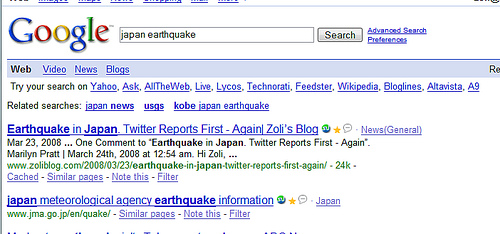
This isn’t anything new, I’ve seen some of my posts get into top Google positions before – but it’s more understandable when I write about a more obscure subject, or a startup nobody else covers… like Brainkeeper, where my post was #1 for months, preceding the company’s own site. Being #2 for the fairly generic search on saas very small business is a bit more surprising, and #1 for Microsoft Outlook Sluggish is certainly rather unexpected. Yahoo, for a change, lists my fairly old post as #1 for the very generic search term Startup Executives, and how on Earth did I get to dominate the igoogle for google apps search? 
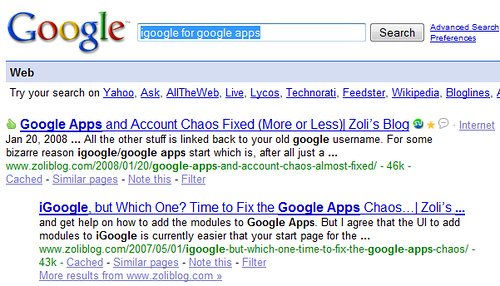
Recently I’ve noticed it almost doesn’t matter what I write about, I can get a premium position for certain relevant keywords. As much as I am enjoying it (hey, who doesn’t like Google Juice), there’s something fundamentally wrong with this system. I think blogs are somewhat overrated, and perhaps individual posts should be weighted on their own merits, not the Google Juice of the main blog itself.
But there’s another conclusion we should draw here. Content is really king, to the extent that it can compete with advertising. Businesses should take notice: you can pay for AdWords, or get to the top by developing your own content – and organic hits are worth more than paid ads. 
There’s another side of the coin here: if you don’t develop your own content, someone else will – and you may not be happy with the results. I’m not sure UPS enjoys seeing my post immediately under their site for the google search UPS Tracking…
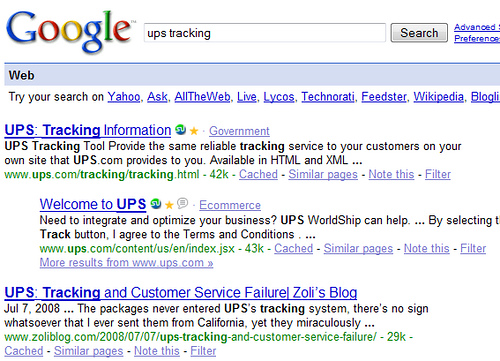
So once again: the old adage “Content is King” has got a new meaning. I’ve been contemplating this for a while, and am getting ready to announce a new initiative in the next few weeks.


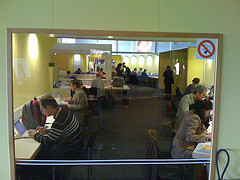
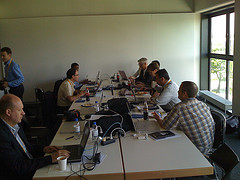




 I’ve
I’ve 

 Yes, it’s great to be able to download my feed items and read it on the plane without Internet connection (since I am not flying Virgin). I even “starred” some entries I want to respond to.But why can’t I mark items “read”? It’s an “online only” action – that does not make sense. When I go back online, Google Reader will perform synchronization anyway; why could it not remember “read” status and sync it?
Yes, it’s great to be able to download my feed items and read it on the plane without Internet connection (since I am not flying Virgin). I even “starred” some entries I want to respond to.But why can’t I mark items “read”? It’s an “online only” action – that does not make sense. When I go back online, Google Reader will perform synchronization anyway; why could it not remember “read” status and sync it?

 ).
).
 ). They are the Naked Buddies – as in co-authors of Naked Conversations.
). They are the Naked Buddies – as in co-authors of Naked Conversations. 
The ZDNet Obstacle Course, or Eating One’s Own Dog Food
Michael Krigsman tends to be critical all the time. Not that he’s mean, but what else can you do when your blog title is IT Project Failures ?
Today’s he’s getting his own dog food served up, in nice bite-sized portions . After poking fun at Bill Gate’s Byzantine Web Experience at Microsoft.com, one of the first comments he received by a fellow Enterprise Irregular was:
. After poking fun at Bill Gate’s Byzantine Web Experience at Microsoft.com, one of the first comments he received by a fellow Enterprise Irregular was:
Ouch… but he is so right. ZDNet has built a hard-to-penetrate comment wall that deters most from entering the conversation. Anyway, the story gets better. Michael received the following email from his own Mother:
Beware of a Mother’s wrath . Joke apart, Michael’s Mom must be quite frustrated, as shown by the all-CAPS.
Joke apart, Michael’s Mom must be quite frustrated, as shown by the all-CAPS.
Jeff Nolan’s more analytical opinion on the EI discussion group:
We hear this left and right. Not only from readers, but from some ZDNet bloggers as well. And while at it, let me quickly admit I was guilty of building an obstacle course myself – although nothing as discouraging as ZDNet’s wall. And to be fair, today’s criticism isn’t directed at Michael, but ZDNet’s management.
I can’t resist (mis)quoting President Ronald Reagan’s famous words :
Read also: Please make it easy for people ZDNet….